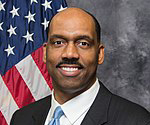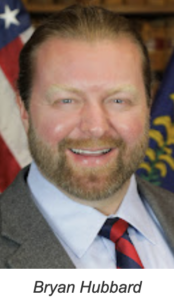Incoming attorney general replaces leading advocate of funding research aimed at legalizing psychedelic for addiction treatment

By Al Cross
Kentucky Health News
The main proponent of using state opioid-settlement money to fund research into a psychdelic drug as a treatment for addiction will soon be out of a job.
Bryan Hubbard, the chair and executive director of the state Opioid Abatement Advisory Commission under outgoing Attorney General Daniel Cameron, will be replaced when Russsell Coleman becomes attorney general Jan. 1. Coleman was elected in November, as his fellow Republican was losing the race for governor.
The commission’s new chair and executive director will be Christoper Evans, a former Drug Enforcement Administration agent and leader who was acting administrator of the agency for more than five months in 2021, while President Biden’s nominee, Anne Milgram, was being chosen and confirmed.
When Coleman announced his executive team in the state Senate chamber Tuesday, Kentucky Health News asked for his opinion and Evans’s opinion of funding research on ibogaine, the African psychedelic that can suppress opioid-withdrawal symptoms but poses risks to the heart and is illegal everywhere but Mexico and New Zealand.
Coleman didn’t give Evans an opportunity to respond, but said “We’re gonna take a look at ibogaine,” and would “make sure we look at that objectively.” He said earlier that “Personnel is policy” and the change signals his belief that the “three-legged stool” of prevention, enforcement and treatment needs to focus more on prevention of drug use.
“We do not have a statewide prevention effort in the commonwealth,” he said, adding later, “There’s some great ideas out there on the prevention side. I want to see if we can scale those up. . . I understand there’s been a lot of ink spilled on ibogaine. My concern is we are not as focused as intently as we should be on the prevention piece of this.”
The commission handles the state’s half of the $900 million or so that the state will get in lawsuit settlements from opioid manufacturers and distributors. As chair and executive director, Hubbard promoted the idea of spending $42 million, about 5 percent of the money, on research aimed at getting Food and Drug Administration approval for use of ibogaine in addiction treatment.
 At the commission’s Nov. 14 meeting, Hubbard read several endorsements of ibogaine by experts, foundations and the American Legion. One foundation is supporting ibogaine research at Stanford University, which is awaiting publication, presumably in a peer-reviewed journal. Hubbard said the researcher had agreed to discuss his findings with the commission after they are published.
At the commission’s Nov. 14 meeting, Hubbard read several endorsements of ibogaine by experts, foundations and the American Legion. One foundation is supporting ibogaine research at Stanford University, which is awaiting publication, presumably in a peer-reviewed journal. Hubbard said the researcher had agreed to discuss his findings with the commission after they are published.
Hubbard noted that on Oct. 31 the National Institutes of Health and the Department of Health and Human Services issued a notice of funding opportunity for research on psychedelics including ibogaine as treatment for substance-use disorder. The notice says “There is an urgent need to develop novel treatments for SUD in light of the escalating rates of substance use, addiction, and overdose.”
Bentley cautioned the commission to be aware of who is funding ibogaine research. Citing his education as a pharmacist and one of the earlier witnesses at the commission, he said he was taught that “If the people paying for the research own the company and the drug, it was invalid from the get-go.”
Gov. Andy Beshear was also critical of the idea and the way it was promoted by Hubbard. His initial promotion of it was countenanced by Cameron, whom Beshear defeated for re-election.
Around the time Cameron implicitly endorsed the idea, a firm owned by a major national political contributor increased its investment in such research and gave Cameron a political boost, the Daily Beast reported.
Unlike Hubbard, Evans will have a deputy: Jessie Halladay, now a senior policy specialist with the Criminal Justice Institute. She has been special adviser to the Louisville Metro Police Department, senior policy adviser to the Kentucky Justice and Public Safety Cabinet, communications director for Jefferson County attorney and a public-safety and social-services reporter for the Louisville Courier Journal.
Evans, who will head the commission starting next month, was the first special agent in charge of the DEA’s Louisville Field Division. In that job, he partnered with Coleman, then U.S. attorney for Western Kentucky, to create a DEA office in Paducah, a Coleman news release said.